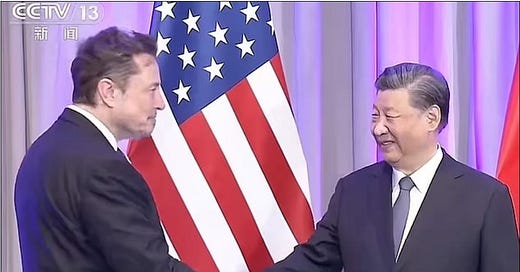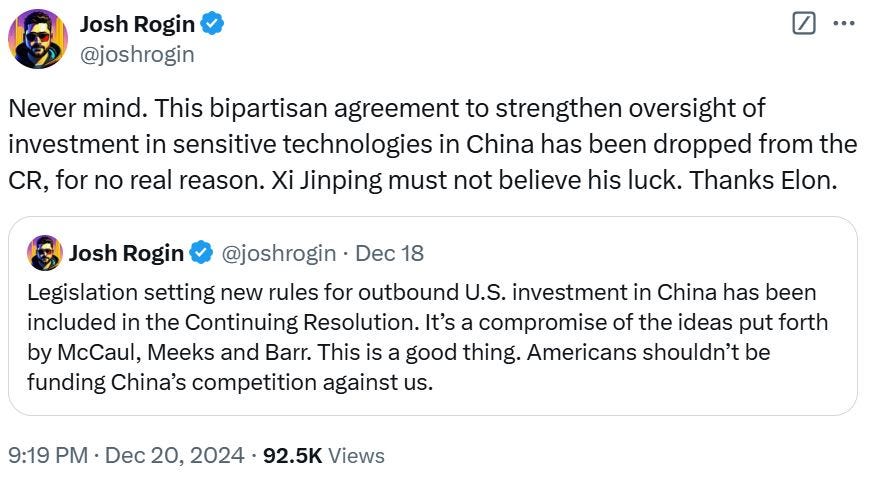And so it begins: GOP pulls punch on China in response to Musk
I’ve predicted a MAGA-CCP convergence. Here’s a sign it’s happening even before Trump takes office.
In a nutshell, what happened this week is:
Negotiators got a bipartisan “tough on China” package into a must-passed spending bill;
Elon Musk posted his opposition to the bill, echoed by President-elect Donald Trump;
Republican House leaders removed the “tough on China” package; and
The bill passed without it.
The initial but rejected bipartisan package included a “Comprehensive Outbound Investment National Security Act” to restrict U.S. money flowing to China's technology sector (such as semiconductors, quantum technology and artificial intelligence), require a study of national security risks posed by Chinese-made consumer routers and modems, mandate reviews of Chinese real estate purchases near additional national security-sensitive sites, and require the Federal Communications Commission to publish a list of every entity that both holds an FCC license or authorization and has any ownership by foreign “adversarial” governments, including China.
To be fair, we don’t have evidence that Elon Musk specifically objected to the China package being in the government funding extension. We do know that he objected en masse to things he claimed were extraneous, and we know that House Republican bill writers removed the China package in response.
We also know that Elon Musk has substantial financial interests in China. He made a business trip to China in April and met with the Chinese premier who praised Musk’s Tesla, which has a ‘gigafactory’ in Shanghai, as a “‘successful model’ for US-China collaboration.” Musk shook hands with CCP chairman Xi Jinping at the APEC summit while human rights activists outside were being beaten up by PRC-recruited thugs. There are also reports that Chinese officials see Musk as a valuable conduit of influence over Donald Trump.
I spent much of this past year in this newsletter documenting evidence of “The coming MAGA-CCP alignment.” My analysis looked at similarities in the ideological and political realm: shared reverence for strongmen, the primacy of Party loyalty to the leader, using the military to crush dissent, elevation of ideological education, hierarchical views that women should serve in traditional roles and ethnic minorities should be assimilated, and more.
Musk shows that there is also a financial component to this MAGA-CCP convergence. Donald Trump too has financial stakes in China. His refusal to eliminate conflicts of interest forces us to question whether his China policy decisions, like opposing a bill with China outbound investment restrictions, are guided by his personal financial interests.
There are other signs of a MAGA-CCP convergence too. Since his election win, Trump invited Xi Jinping, a man many in Congress consider a genocidal dictator, to his inauguration. Trump hosted the CEO of Chinese-owned TikTok at Mar-a-lago following his pledge to ‘save’ Tik Tok from a ban or divestment after lawmakers determined the platform was a vector for CCP influence.
There’s a good chance you’ll get several posts from me in 2025 saying “I told you so” about Trump bringing his movement and his Party into alignment with Xi Jinping and the CCP in the same way he has made them into fans of Vladimir Putin, Viktor Orbán, protectionist tariffs and statism. The way House Republicans caved in obeisance to Musk and Trump and deleted the China outbound investment package makes that prospect look more likely.





